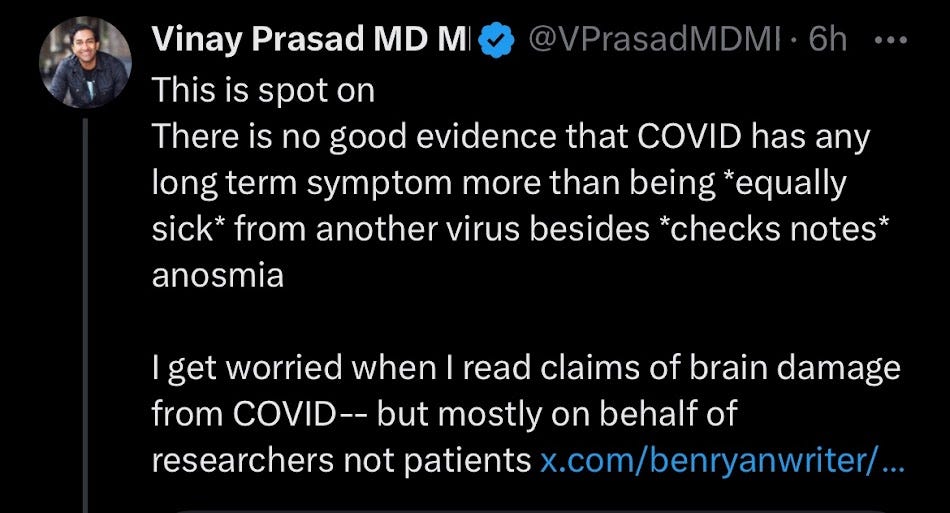Rules Design & Evidence Based Medicine
Vinay Prasad's Obelisk of Charlatan Science
The Joy of the Game
Imagine a friend invites you over to playtest a new boardgame they have designed. You crack open a few beers and share some laughs, but after about 90 minutes of play, you start to realize that your friend has designed this game's rules in such a way that it's functionally impossible for you to actually win. Odds are, you likely wouldn't come over to play again, and possibly stop being friends with such a person.

Basic game design theory should be a part of any educational curriculum, if only to put students through the mindset of constructing rules, the goals of why one would design certain rules, and how rules are negotiated & enforced: a critical lens to analyze politics and other complex topics. The goal of game design, at its core, is to develop a challenging & entertaining interactive experience so all players have a good time. When playing tabletop wargames such as Warhammer or Battletech, it's understood that players may need to negotiate to resolve disputes over how best to interpret the text of their extensive rulebooks - competitive leagues will often feature referees to help facilitate friendly play & good sportsmanship for the enjoyment of all.
Frankly put, an asshole is not concerned with the enjoyment of others - our imaginary friend from before derived enjoyment and self-worth from making you look like a fool for playing along with their rigged game in good faith. In the traditional sense, "debate" can be quite game-like in its format & construction of rules, leaving the "performance" of debate to often be more important than serious intellectual inquiry and the stripping away of falsehoods. For decades, the Internet has been infested with obnoxious "debate-bros" that, whilst clearly lacking much in the way of critical thinking skills, and often possessing severe moral & ethical depravity, have cultivated an online audience of "performing" imagined intellectual superiority above others in a public forum. Sadly, these audiences are easily misinformed.

You can't have an honest debate with a perpetually dishonest person, or somebody who refuses to admit when they've been proven objectively incorrect or woefully illiterate about the topic that they claim to be an expert about. For many, encouraged in the age of gamified discourse on social media, they're simply too immature to admit fault or a mistake. Thus, they construct their own set of rules that everyone else but themselves must follow, as the central protagonist in a story that looms over the rest of the cast with their alleged intellectual superiority.

Which brings us to "Evidence-Based Medicine," a popular phrase thrown around by pro-disease advocates & fraudsters like University of California San Francisco's Vinay Prasad, or Tom Jefferson & Carl Heneghan of the scientifically illiterate "Cochrane review" of Personal Protective Equipment (PPE).
The Monolith of Evidence-Based Medicine
The term "Evidence-Based Medicine" (EBM) sounds really great on paper, especially to the general public: Obviously, we want our doctors to use the best available evidence when making decisions about the treatment and care involved in improving or maintaining our health. The framework and arguments around EBM go back decades, as documented by David Gorski for Science Based Medicine.
Dr. Gorski writes:
"If you look at the EBM pyramid, you will see that basic science is near the bottom, while [Randomized Control Trials] and meta-analyses of RCTs are at the very top."

Any adult who has developed a little bit of "street smarts" over the years would be wary at what is clearly a diagram of a pyramid scheme. In ancient civilizations, the pyramid was a religious monument to curry favor with the gods. Ancient rulers, believed to have a mandate to rule granted by infinitely powerful beings, would often be buried in these sacred structures - with their most loyal servants killed to continue an eternity of servitude in the afterlife. In modern times, the pyramid or "Ponzi" scheme, many known as "Multi-Level Marketing Companies," promise great wealth by selling a fantasy of climbing up tiers of the pyramid to a golden throne of lavish luxury on the top, laughing down at everyone else.
When you rise to the top of the EBM pyramid, you yourself shall gain the forbidden mystical powers to not only be the final judge of all forms of medicine, but every other form of science as well. Many of the loudest advocates for an ignorant, "do nothing" approach to the SARS-CoV-2 pandemic will hide behind the brand of "Evidence Based Medicine," knowing the general public isn't scrutinous enough to investigate what that term actually represents. Alas, across town in the world of advertising, manipulative language is our trade - and the public deserves better than to be misled when it comes to making informed decisions about protecting their health and the health of their families - especially children.
Ask yourself this: Can the item pictured below be considered “medicine?”
Obviously not. It is Personal Protective Equipment, not PPE. It is researched, designed, evaluated, and developed by engineers, not doctors. It cannot be evaluated by the rules of "Evidence Based Medicine," because a respirator is quite simply not medicine, and the use of RCTs to evaluate PPE would be highly unethical.

UCSF’s Vinay Prasad still publicly cites the oft-debunked Cochrane-review on masking, written by his fellow EBM cohorts Carl Heneghan and Tom Jefferson, even though both refuse to admit that SARS-CoV-2 is an airborne virus (!) - and committed numerous basic statistical errors in their charade of constructing evidence to debunk decades of PPE engineering, a topic none of these three are qualified to evaluate in any scientific capacity. However, they have an opinion, and their feelings are more important than facts and the hard work of scientists in relevant specialties.
PROFILE: UCSF's Vinay Prasad
"Instead of randomized trials, which balance outcome distributions in the absence of Tx effects, the authors of this piece [in Scientific American critical of the Cochrane mask review] prefer comparisons of places that are fundamentally different beyond masking choices. It's sad that Scientific America has become so unscientific."
As we have documented in the past, UCSF's Vinay Prasad has wasted years of his academic career personally profiting by misleading his social media audience that only Vinay Prasad (and his fellow unscientific quacks) is uniquely qualified to evaluate medicine, all other forms of science, and alone is permitted to lash out and ridicule those with real-world responsibilities. Even with all the funding to establish a laboratory in his own name, Vinay Prasad has never performed any of the RCTs he has frequently demanded from others.
Instead, Vinay Prasad writes opinion editorials and bizarre rants falsely branded as scientific literature, including one embarrassing diatribe about tweets regarding the 2022 Monkeypox outbreak, in a bizarre wedge against the precautionary principle of public health. Meanwhile, Vinay Prasad of UCSF further drags the medical institution's name through the mud by lashing out and making personal insults against those with real-world responsibilities beyond ranting into a webcam or smashing a keyboard aggressively for personal gain.
Vinay Prasad, bringing great shame to his billionaire patrons and the University of California San Francisco, is not producing "Evidence Based Medicine" that would further the medical profession's ability to save lives. This behavior is much more akin to an adolescent message board poster from the early-2000s era of arguing about which videogame console is superior. There is no place for this in any professional, medical, or scientific environment, and should be dismissed just like Prasad's fellow viral sycophant, Martin Kulldorff formerly of Harvard.
The Fine Line Between Science & Sham

This shouldn't be a radical concept to understand, but the medical and scientific worlds are vastly complicated, technical spheres of thought with numerous disciplines and many different types of specialties. When it comes to a global pandemic such as SARS-CoV-2, it's essential that our various experts can work together to further our understanding and develop the best response to save human lives, instead of crawling on their hands and knees proving their loyalty to false leaders of some devout mythical framework that is solely masturbatory in nature. Science and medicine are a collaborative practice, not a top-down tyrannical superstructure in which one Substack quack is qualified to evaluate all other fields.
Bettering our scientific understanding of the world, and how best to respond to the challenges presented by the ongoing COVID-19 pandemic, requires respect, humility, and standards of professionalism and decency that Evidence-Based Medicine's loudest champions outright reject, as it flattens the very pyramid they seek to rest above, making bold proclamations to their loyal fanbase, that turn around and engage in campaigns of abuse and harassment against hardworking scientists who respect their real-world responsibilities, hoping to silence EBM's critics. Vinay Prasad may claim to be a proponent of free speech, but his choice to silence his critics and cultivate an echo chamber of anti-vaccine cranks that engage in frequent abuse, insults, and threats make him and his fellow EBM cohorts wholly unequipped to manage the challenges of this still unfolding COVID-19 pandemic.

Accepting this reality means that the loudest angry keyboard warriors like Vinay Prasad are no longer the most important voice in the room. For some, bruised egos are more important than saving lives: the primary responsibility of any medical professional. Prasad's followers should be ashamed - they have fallen for a scam and been duped by a common charlatan, desperate to make a name for themselves by agitating for a wholly self-destructive vision of future pandemic responses: drowning children face-first in whatever new pathogen arrives on our shores without an ounce of responsibility.

The sad truth is that the loudest voices of "Evidence Based Medicine" don't care about professional standards or getting the science right. They are much more concerned about presenting themselves as intellectually superior to a dedicated online audience, regardless of the real-world consequences that result from dishonest, unprofessional, and frankly childish behavior that harms patients’ health.





